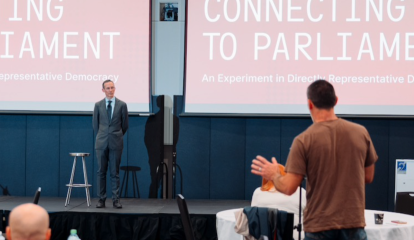
A Map of Government: Democracy Guide
When people feel heard and valued by their representatives, they're more likely to engage in the political process. That's the idea behind Democracy Guide (Demokratie-Wegweiser): constructing a map of government officials so that people can easily identify who is responsible for what and who they should reach out to.
Read more
How Belgium is Giving Citizens a Say on AI
Within the scope of its ongoing Presidency of the European Council, Belgium has convened a citizens’ assembly on AI, with the aim of giving a representative group of citizens a say. The organisers hope it will be just one of many such ventures in future.
Read more
The Lost Contributions to France’s Great Debate
In the early days of the yellow vest movement, a series of notebooks were placed in town halls around France for residents to share their thoughts on the future of France. The story of the so-called "lists of grievances" contains some important lessons for the future of democratic innovations.
Read more
Pluralism: A Platform for Arguing Respectfully
Pluralism provides a model for a new kind of online interaction, which rewards good-faith dialogue instead of provocation and hate.
Read more
Meta Experiments With Public Consultation on AI
In October 2023, Meta hosted a “Community Forum on Generative AI.” The online event gave randomly selected members of the public the chance to share their views on the principles governing the use of AI chatbots. It is one of the first cases of a private company using established deliberative democracy methods to consult the public, raising key questions about accountability. Democracy Technologies was invited to observe the event.
Read more
Can Alignment Assemblies Bring Democracy to Silicon Valley?
Last year, a series of AI developers began experimenting with new democratic ways of shaping the future of the technology. Among the most prominent were the Alignment Assemblies, run by the Collective Intelligence Project. Their work with Anthropic and OpenAI demonstrates the potential of public involvement in AI, while also raising questions about the place of these processes within the broader picture of the regulation of the field.
Read more
Making Political Primaries More Democratic
Can alternative voting methods help to make political primaries more democratic, while also reducing the risk posed by polarising candidates?
Read more
Connecting to Parliament: Deliberating with Politicians
Citizens’ assemblies are enjoying a moment in the spotlight – but they often cut elected officials out of the picture altogether. Several less well-known formats worldwide apply similar methods with the aim of getting representatives and voters to talk to one another. Among them is Australia’s “Connecting to Parliament”.
Read more
Radical Data: Art, Activism, & Technology
Rayén Jara Mitrovich is a co-founder of Radical Data, a collective that uses data and builds tools to empower communities and help shape alternative futures. We caught up with them to talk about AI biases, Chile's failed new constitution, and the intersection between art, activism, and technology.
Read more
AI and the Future of Participation
One of the many highlights at DecidimFest 2023 was Xabier E. Barandiaran’s talk on Artificial and collective intelligence. We sat down with him at the festival to talk to him about why human intelligence has always been artificial and collective, why open source AI shouldn’t be underestimated, and his idea of “artificial democratic life.”
Read more
What is (Digital) Deliberation?
Some are hailing it as the greatest hope for the future of our democracies. But what exactly is deliberation, and what role do digital tools play?
Read more
The Race to Democratise AI
Over the last year, several major AI developers, including Meta and OpenAI, have started taking an interest in deliberative democracy tools. The aim: to collect public inputs on the regulation of AI. We take stock of the developments so far – and ask what it means for the field as a whole.
Read more
Intelligence: Artificial, Collective, or Otherwise. Decidim Fest 2023
This year’s Decidim Fest took place as part of Barcelona’s European Capital of Democracy programme year. Members of the Meta Decidim community converged on the Canódrom to talk about the topic “Democracy, Technology and Artificial Collective Intelligence.” Read some of the highlights here.
Read more
Everyone Can Be an Election Observer With Self-Enforcing e-Voting
Think back to the last time you voted. How certain are you that your vote was counted correctly? It doesn’t matter how you voted – using a paper ballot or a voting machine, by post, or online. Currently, there is no system in use in large-scale political elections anywhere in the world that allows voters […]
Read more
AI in Digital Citizens’ Participation – Where Do We Stand?
Webinar Recap | On 10 August, democracy-technologies.org hosted the webinar “AI in Digital Citizens Participation – Where do we Stand?” Robert Bjarnason (Citizens Foundation), Bianca Lüders (Agency for Geoinformation and Surveying, City of Hamburg) and Eva Mayer (CitizenLab) joined us to talk about how they are integrating AI into their platforms.
Read more